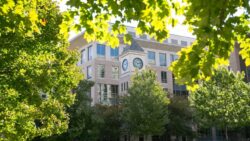Don’t let his role in the North Korean nuclear negotiations, former position as a high-level national security advisor to George W. Bush, or admiring Washington Post profile fool you: Victor Cha is just another run-of-the-mill academic.
Or at least you would think so if you were seated in his ICC office on a cold Wednesday morning in early March. Cha cuts a rather unremarkable figure in person, dressed in the standard professorial uniform-neutral tones and herringbone. His office includes the requisite packed bookshelf, a smattering of mahogany furniture, and neatly framed pictures. A poster of the Georgetown Basketball squad tucked behind the door is the only aberration from the pristine scholarly decor.
None of this, however, betrays Cha’s rather remarkable three years of service as Director of Asian Affairs for President George W. Bush’s National Security Council, during which he responded to a tsunami deemed one of the greatest natural disasters in modern memory and guided talks with a dangerously erratic North Korea. Not too shabby for a mild-mannered lecturer in geek-chic glasses, a veritable Clark Kent of Asian-American relations.
Even with his impressive resume, Cha is just another face in the crowd at Georgetown, a school populated by students so jaded by American political celebrities and big-name wonks as faculty members that it seems only the likes of Coolio can rile up any real frenzy on campus.
Given the University’s location a stone’s throw from the seat of the federal government (a fact prominently featured in endless glossy recruitment pamphlets), it’s no wonder that Peter Dunkley, Associate Dean for Faculty for the School of Foreign Service, can’t recall a time in his 30 years on the Hilltop when Georgetown wasn’t attracting the cream of the international affairs crop.
“This institution has always had many prominent individuals and public figures among its faculty,” he wrote in an email.
Unsurprisingly, University spokeswoman Julie Green Bataille touted the importance of Georgetown’s location
“D.C. presents many natural synergies for high level officials to visit and teach on campus and provides our students with access to individuals who can help provide an understanding of the connections between theory and practice,” she wrote in an e-mail.
Indeed, like cherry blossoms and tourist mobs, Georgetown professors and the government have a natural affinity for each other made evident most clearly during times of political transition, like the recent presidential election. Scores of academics from the Hilltop have traded in their mortarboards to enter administration posts, while exiting government officials seek refuge in the halls of academia. In Washington, it seems the grass is always greener on the other side of Foggy Bottom.
In recent months, Georgetown has seen six faculty members leave for the Obama administration, though if history is any indication, those newly vacant offices could soon be filled with former Bush officials seeking a smooth transition from the public sector.
Cha got a jump on his colleagues from the administration, returning to Georgetown in the spring of 2007 from a leave of absence, a whirlwind three years after joining the National Security Council. Cha’s stint at the White House was a role that he never could have imagined as a starry-eyed Ph.D. candidate.
“I went into the field of political science with never any intention to do policy at all,” he said. “It was strictly to be an academic and write books and go to conferences, teach some smart students.”
Until 2004, Cha’s career trajectory, while impressive-he received not one but two Fulbright Scholarships-was fairly standard for a talented academic. His publications were well-respected, as was his teaching: Cha receives rave reviews on ratemyprofessor.com, and has even been awarded the coveted chili pepper icon indicating “hotness.” Even his first encounters with Condoleezza Rice, then Provost of Stanford University, were mundane, meeting her while on sabbatical in California from 1998-1999.
His courtship by the Bush administration was, according to Cha, easy and natural. During Bush’s first term in office, Cha began to publish opinion articles on Asian policy in The New York Times and The Washington Post, and came to be regarded as what he terms a “voice” within policy-making circles. Soon he was being called in as a consultant for the Bush White House; from there, things moved quickly.
“One thing led to another, and they sort of asked, would you be interested in working here?” he said, describing the hiring process as a low-key wooing, based upon a familiarity and an understanding between him and fellow former academic, Rice.
So, how could Cha justify his departure from Georgetown to take an indefinite leave of absence, for a post some colleagues have since told him they never thought he would return from? The simple answer is that the University’s proclaimed commitment to public service is real and vibrant, personified by one man in particular, Robert Gallucci, Dean of the School of Foreign Service.
*****************************
It’s just after lunch, and the hive of intellectual and bureaucratic activity in the main hub of the SFS is quietly humming away as a gaggle of khaki-clad (and, yes, even argyle-wearing) individuals stroll through the maze of glass-walled offices. The waiting area outside the Dean’s Office is quiet, distinguished from the rest of the department by its imperial blue couches and framed paintings of campus.
A man wearing a puffy winter overcoat strides into the small lounge, coyly leans over the receptionist’s desk, and orders a Ketel One martini, straight up. It’s Dean Gallucci, and he appears to be in a good mood.
And for good reason: only days after ordering his fictional mid-afternoon martini, the University announced his departure from Georgetown to serve as the president of the John D. and Catherine T. MacArthur Foundation, one of the country’s most respected private grant-giving organizations.
Gallucci will leave in July after 13 years as Dean of the SFS. Prior to his 1996 hiring, however, he spent 21 years working for the government, serving as, among other things, an Ambassador at Large and the Assistant Secretary of State for Political-Military Affairs during the Clinton administration,
Like Cha, Gallucci never pictured himself becoming a company man.
“I saw myself as being a career scholar,” he said, speaking of his youthful ambitions.
Indeed, before entering government service, Gallucci taught at Swarthmore College. He also served as a professional lecturer at Georgetown from 1981-1983 while working at the State Department’s Bureau of Intelligence and Research.
Gallucci put his government connections to use once he became Dean of the SFS, helping to orchestrate the hiring of heavy-hitters in the realm of international affairs, perhaps most notably former Secretary of State Madeline Albright.
With his affable, confident manner of speaking, it’s easy to imagine Gallucci as a persuasive negotiator-indeed, he led difficult negotiations with North Korea in 1994. Persuasive, but also persistent, as evidenced by Gallucci’s account of his pursuit of Albright.
“When [Albright] became Secretary of State and she was in her third year or so, I started lobbying with her early on. I wanted to be first in line,” Gallucci said. “I knew that there would be other people making her offers, and I wanted to make sure that she knew just how enthusiastic we would be at Georgetown if she decided to come here.”
Gallucci’s chutzpah also played a key role in convincing former CIA director George Tenet to come to Georgetown-the Dean says he pursued the embattled Tenet “in a way not entirely dissimilar” to how he went after Albright-though simple luck has made the acquisition of other high-profile distinguished professors possible as well.
Sometimes it all just depends on the Boston Red Sox.
Or so it was in the case of former Clinton-era National Security Advisor Anthony Lake, whose chance encounter with Gallucci at a Sox game ultimately brought him to Georgetown.
In 1997, Lake was leaving what he called the “political circus” of his defeated nomination for director of the CIA-what many saw as an act of retribution by the Senate towards President Clinton.
“Being road kill,” the white-bearded Lake said as he leaned back in his cozy office, surrounded by family pictures and diplomatic memorabilia, “is not pleasant.”
To recover, he decided to get out of Washington.
“I did what any right-thinking person would do and went to Florida for spring training,” Lake said.
Purely by chance, he ran into Gallucci; as the two watched a game together, the Dean proposed that Lake-who had worked at Mount Holyoke College and Amherst before entering government service-consider teaching at Georgetown. Lake soon accepted, and until recently, he remained out of the political limelight.
In 2006, however, Barack Obama asked Lake to head one of his foreign policy teams, after Lake had periodically advised the then-senator on foreign affairs. Lake quickly accepted, though he denies that he saw the campaign as a way to get back into government.
“I told [the Obama campaign] I did not want anything and then I reaffirmed that during the course of the campaign,” Lake said.
He called claims by sources such as The New York Times that he was on Obama’s shortlist for Director of the CIA “totally uninformed” and said that he called the Obama transition team after the election to ask them to tell reporters that he would not seek a position in the administration.
“At a certain age you decide the torch should be passed, and a lot of very competent people could do what I would have been doing,” Lake said, explaining his reticence to re-enter public life.
The pressures and stresses of policy work at the highest levels of government can indeed take their toll, proving overwhelming at times. Cha recalled that his work days at the Bush White House would often last from 7:30 in the morning until 10 at night, and that he was at the office six to seven days a week.
“It’s a 24/7 lifestyle where your closest companion is your Blackberry,” he said, recalling that after he left the Bush Administration, his young son was dumbfounded to see him at home in the evenings.
Despite the sacrifices necessary for high-profile public service, both Cha and Lake were quick to emphasize the privilege of working to serve the interests of the United States.
“You never become jaded by the whole thing,” Cha said of working daily in the White House, consulting with the president even while Bush was in his pajamas in the residence.
University life, however, retains its appeal to haggard public servants as a haven of quiet study and thought. Gallucci is quick to point out that high profile professors are not the highest-paid academics on campus, but instead are sold on the idea of teaching by the promise of a stimulating and sustainable intellectual life.
Tenet, who had no previous teaching experience prior to his arrival at Georgetown, proved to be, by all accounts, an engaging professor.
“Between four years of undergrad and two years of grad school, I’ve had great professors, okay professors, awful professors. Tenet ranks near the top,” former student Gene Gerzhoy (SFS ’07) said, praising his give-and-take discussion style, one-on-one office hour availability, and fondly recalling Tenet’s proclivity to chew on cigars during class.
By contrast, a current student in Albright’s undergraduate seminar said that, while the former Secretary of State brings practical knowledge to the classroom, she can seem “distant” and impersonal.
Cha expressed no doubt that, despite his time in the White House, his most natural environment is the classroom, though he conceded that he might consider policy work in the future. At the moment he isn’t looking for a job, giving Georgetown students more opportunities to experience what one enthusiastic ratemyprofessor.com commentator calls, “the MAN” and “the legend.”
For his part, Lake has learned to get an adrenaline rush-previously garnered from the challenges of high-pressure government policy-making-from his involvement with NGOs, watching the Red Sox beat up on the Yankees, and working with students.
“Teaching is just flat-out fun,” Lake said with a grin.
“Except for reading the papers.”




